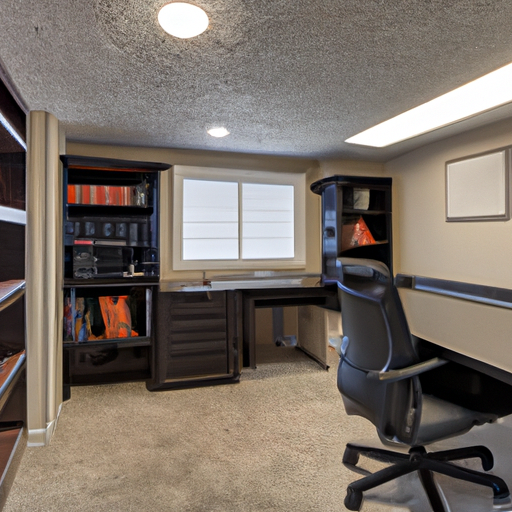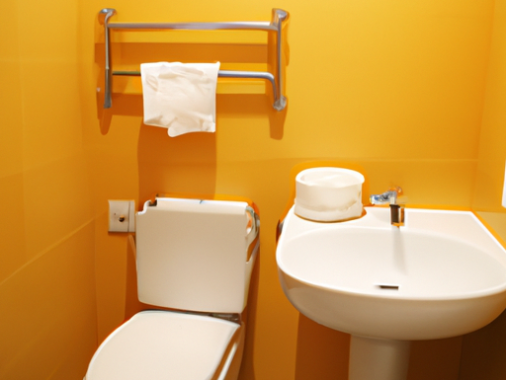-
Table of Contents
- Introduction
- How to Create a Home Office in Your Basement
- Tips for Maximizing Space in Your Basement Home Office
- The Benefits of Working from a Basement Home Office
- How to Design a Basement Home Office for Maximum Productivity
- How to Soundproof Your Basement Home Office
- How to Choose the Right Lighting for Your Basement Home Office
- How to Choose the Right Furniture for Your Basement Home Office
- Q&A
- Conclusion
Introduction
Welcome to the home office basement! This is the perfect place to set up a workspace and get creative. Whether you’re a freelancer, a student, or a business owner, the home office basement can be a great place to get work done. With the right setup, you can create a comfortable and productive environment that will help you stay focused and productive. Here, you’ll find tips and tricks for setting up your home office basement, as well as ideas for making it a more inviting and inspiring space.
How to Create a Home Office in Your Basement
Creating a home office in your basement can be a great way to maximize space and create a productive workspace. With a few simple steps, you can transform your basement into a comfortable and efficient office.
First, assess the space. Consider the size of the room and the amount of natural light available. If the room is too dark, you may need to install additional lighting. Also, consider the layout of the room and how you can best utilize the space.
Next, choose a desk and chair. Make sure the desk is large enough to accommodate your computer and other office supplies. The chair should be comfortable and adjustable to ensure proper posture.
Third, add storage. Shelves, cabinets, and drawers can help keep your office organized and clutter-free. Consider adding a filing cabinet to store important documents.
Fourth, add décor. Choose items that will help you stay focused and motivated. Consider adding a few plants, artwork, or motivational quotes to the walls.
Finally, make sure the room is comfortable. Install a mini-split air conditioner or heater to keep the temperature comfortable. Also, consider adding a rug or carpet to reduce noise and make the room more inviting.
By following these steps, you can easily create a home office in your basement. With a few simple changes, you can create a productive workspace that will help you stay organized and motivated.
Tips for Maximizing Space in Your Basement Home Office
1. Utilize Vertical Space: Make use of the walls and ceiling of your basement home office by installing shelves and cabinets. This will help you to store items that you don’t need to access on a regular basis, freeing up floor space.
2. Invest in Multi-Purpose Furniture: Choose furniture that can serve multiple purposes. For example, an ottoman can double as a coffee table and a storage unit.
3. Use Under-Desk Storage: Make use of the space beneath your desk by installing drawers or shelves. This will help you to store items such as office supplies and documents without taking up valuable floor space.
4. Install Wall-Mounted Desks: Wall-mounted desks are a great way to maximize space in your basement home office. They are also a great option if you don’t have a lot of floor space to work with.
5. Utilize Corner Space: Don’t forget about the corners of your basement home office. You can install shelves or cabinets in the corners to store items that you don’t need to access on a regular basis.
6. Use Wall-Mounted Lighting: Wall-mounted lighting is a great way to save space in your basement home office. It will also help to create a more inviting atmosphere.
7. Choose Compact Electronics: When selecting electronics for your basement home office, opt for compact models. This will help to save space and keep your office looking neat and organized.
The Benefits of Working from a Basement Home Office
Working from a basement home office can be a great way to increase productivity and efficiency while also providing a comfortable and convenient workspace. There are many benefits to working from a basement home office, including increased privacy, improved focus, and cost savings.
Privacy is one of the main advantages of working from a basement home office. Basements are typically located away from the main living areas of the home, providing a quiet and private space to work. This can be especially beneficial for those who need to make phone calls or take part in video conferences without interruption. Additionally, the lack of foot traffic in the basement can help to reduce distractions and improve focus.
Another benefit of working from a basement home office is the potential for cost savings. Basements are typically less expensive to furnish and maintain than other areas of the home, making them an ideal choice for those who are looking to save money. Additionally, the lack of natural light in the basement can help to reduce energy costs.
Finally, working from a basement home office can provide a comfortable and convenient workspace. Basements are typically cooler than other areas of the home, making them ideal for those who prefer to work in a cooler environment. Additionally, basements are typically equipped with plenty of storage space, allowing for easy organization of office supplies and documents.
In conclusion, working from a basement home office can be a great way to increase productivity and efficiency while also providing a comfortable and convenient workspace. The increased privacy, improved focus, and cost savings associated with working from a basement home office make it an ideal choice for those who are looking to maximize their productivity.
How to Design a Basement Home Office for Maximum Productivity
Designing a basement home office for maximum productivity requires careful consideration of the space, furniture, and technology. By creating an environment that is comfortable, organized, and conducive to productivity, you can ensure that your home office is an effective workspace.
First, consider the size and layout of the space. If possible, choose a room with plenty of natural light and adequate ventilation. If the room is too small, consider using furniture that can be moved around to maximize the available space. Additionally, make sure that the room is free of clutter and distractions.
Next, select the right furniture for the space. Choose a desk that is large enough to accommodate all of your work materials and equipment. Additionally, select a comfortable chair that is adjustable and supportive. If possible, add a filing cabinet or storage shelves to keep your workspace organized.
Finally, make sure that your home office is equipped with the right technology. Invest in a reliable computer and printer, as well as a high-speed internet connection. Additionally, consider purchasing a headset or noise-canceling headphones to help you focus.
By following these steps, you can create a basement home office that is comfortable, organized, and conducive to productivity. With the right space, furniture, and technology, you can ensure that your home office is an effective workspace.
How to Soundproof Your Basement Home Office
If you are looking to create a home office in your basement, soundproofing is an important step to ensure that you can work in a quiet and comfortable environment. Here are some tips to help you soundproof your basement home office.
1. Install Soundproofing Materials: The most effective way to soundproof your basement home office is to install soundproofing materials. These materials can include acoustic foam, soundproofing blankets, and acoustic panels. These materials absorb sound waves and reduce the amount of noise that enters the room.
2. Seal Gaps and Cracks: Gaps and cracks in the walls and ceiling can allow sound to enter the room. To reduce the amount of noise that enters the room, seal any gaps and cracks with caulk or acoustic sealant.
3. Add Carpet or Rugs: Carpet or rugs can help absorb sound and reduce the amount of noise that enters the room.
4. Install a Door Sweep: Installing a door sweep on the bottom of the door can help reduce the amount of sound that enters the room.
5. Use Soundproof Curtains: Soundproof curtains can help reduce the amount of noise that enters the room.
By following these tips, you can soundproof your basement home office and create a quiet and comfortable environment for working.
How to Choose the Right Lighting for Your Basement Home Office
When it comes to creating a comfortable and productive home office in your basement, lighting is an essential element. Poor lighting can lead to eyestrain, headaches, and fatigue, all of which can negatively impact your productivity. To ensure that your basement home office is properly lit, here are some tips to consider:
1. Choose the Right Bulbs: Fluorescent bulbs are the most energy-efficient option for a basement home office, but they can be harsh and unflattering. Instead, opt for LED bulbs, which are more energy-efficient and provide a softer, more natural light.
2. Consider Task Lighting: Task lighting is essential for any home office. Invest in a desk lamp or wall-mounted light to provide direct light for tasks such as reading and writing.
3. Utilize Natural Light: If your basement has windows, take advantage of the natural light they provide. Install blinds or curtains to control the amount of light that enters the room.
4. Add Ambient Lighting: Ambient lighting is important for creating a comfortable atmosphere in your basement home office. Consider adding a floor lamp or wall sconces to provide a soft, diffused light.
By following these tips, you can ensure that your basement home office is properly lit and comfortable. With the right lighting, you can create a productive and enjoyable workspace.
How to Choose the Right Furniture for Your Basement Home Office
When it comes to furnishing your basement home office, it is important to choose the right pieces to ensure that you have a comfortable and productive workspace. Here are some tips to help you select the best furniture for your basement home office.
First, consider the size of the room. Measure the space and determine the size of furniture that will fit comfortably. Make sure to leave enough room for movement and to accommodate any additional furniture you may need.
Second, think about the type of furniture you need. Do you need a desk, a chair, shelves, or other storage pieces? Consider the type of work you will be doing in the office and choose furniture that will best suit your needs.
Third, consider the style of furniture you want. Do you prefer a modern look or a more traditional style? Choose furniture that will complement the overall look of your basement home office.
Fourth, think about the materials you want your furniture to be made of. Choose furniture that is durable and easy to clean.
Finally, consider the cost of the furniture. Make sure to shop around and compare prices to get the best deal.
By following these tips, you can ensure that you choose the right furniture for your basement home office. With the right pieces, you can create a comfortable and productive workspace that will help you get the most out of your work.
Q&A
1. Is it safe to have a home office in the basement?
Yes, it is generally safe to have a home office in the basement, provided that the basement is properly ventilated and free from any moisture or mold. It is also important to ensure that the basement is properly insulated and heated to prevent any potential health risks.
2. What are the benefits of having a home office in the basement?
Having a home office in the basement can provide a number of benefits, including increased privacy, more space, and a quieter environment. Additionally, having a home office in the basement can help to reduce distractions and provide a more productive work environment.
3. What should I consider before setting up a home office in the basement?
Before setting up a home office in the basement, it is important to consider the layout of the space and the type of furniture and equipment that will be needed. Additionally, it is important to ensure that the basement is properly ventilated and free from any moisture or mold.
4. What type of furniture and equipment is needed for a home office in the basement?
The type of furniture and equipment needed for a home office in the basement will depend on the type of work that will be done. Generally, a desk, chair, computer, printer, and other office supplies will be needed.
5. How can I make my home office in the basement more comfortable?
To make a home office in the basement more comfortable, it is important to ensure that the space is properly insulated and heated. Additionally, adding a few personal touches such as artwork, plants, and comfortable furniture can help to make the space more inviting.
6. What safety precautions should I take when setting up a home office in the basement?
When setting up a home office in the basement, it is important to take safety precautions such as ensuring that the space is properly ventilated and free from any moisture or mold. Additionally, it is important to ensure that all electrical equipment is properly grounded and that any cords are kept away from water sources.
7. Are there any special considerations for setting up a home office in the basement?
Yes, there are a few special considerations for setting up a home office in the basement. For example, it is important to ensure that the space is properly insulated and heated to prevent any potential health risks. Additionally, it is important to ensure that all electrical equipment is properly grounded and that any cords are kept away from water sources.
Conclusion
The home office basement is a great way to create a dedicated workspace in your home. It can provide a comfortable and productive environment for working, and can be customized to fit your needs. With the right planning and design, you can create a space that is both functional and aesthetically pleasing. Whether you are looking for a place to work, a place to store items, or a place to relax, the home office basement can be a great addition to your home.




